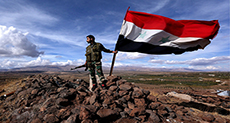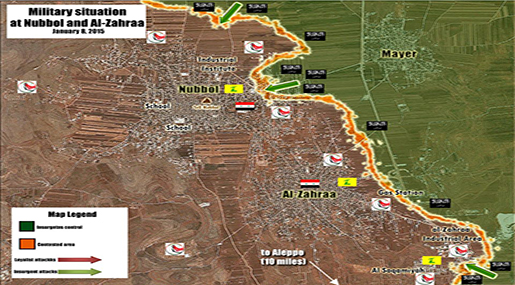
The Breaking of the Siege of Nubul and Zahraa

Darko Lazar
Talk over the possible outcome and conclusion of the war in Syria has finally started. But it is not being discussed at the "peace talks" in Geneva, which broke down shortly after getting underway. Rather, it is being decided on the front lines of Syria's northwestern province of Aleppo.

On February 3rd, following three days of heavy clashes, the Syrian army and its allies broke a three-year militant siege of Nubul and Al-Zahraa in the northwest of the country, cutting off one of the insurgents' main routes to Turkey.
The advances on the two Shiite towns with a population of roughly 60,000 have put the Syrian army within just three kilometers from cutting off the last remaining militant pipeline, which runs from northern Syria into Turkey and has been fueling much of the violence since the start of the conflict.
The conclusion of the Nubul and Al-Zahraa siege was preceded by the liberation of the town of Ataman - the gateway to the southern city of Deraa, whose old quarter connects with the Jordanian border and remains under militant control.
In line with similar victories, the latest news further highlights that the Syrian army, backed by Lebanon's Hizbullah, Iranian forces and Russian airpower, is on the march - taking strategic towns both in the north and the south of the country, while fighting Daesh on three different fronts. The progress has been slow but persistent.
"One of our biggest problems has always been the border, especially our border with Turkey", said Afraa Dagher, a Syrian activist in Latakia.
She adds that the advances in Aleppo and the neighboring province of Latakia in recent weeks have been especially painful for Turkey's President Recep Tayyip Erdogan, "and to his dream of creating a buffer zone in northern Syria to keep aiding his terrorist fighters. Turkey occupied an important part of Syria, and Erdogan is still dreaming of joining Aleppo to his entity."
Damascus-based journalist Iyad Khauder, who worked as a stringer for a Der Speigel journalist in 2012, recalled an interview between the German reporter and a Syrian general.
"These were some of the worst times for Syria and the reporter asked the general how the Syrian army intended to regain lost territory. He confidently replied, ‘close the Turkish border and the Syrian army will finish the job in a few months'," Khauder said.
Calling the Syrian army advances in Aleppo a "game-changer", he added that the cutting of the militant supply lines with Turkey is part of broader, "strategy to isolate the militants on ‘islands', so that they cannot coordinate their efforts".
The developments on the battlefield have been a bitter pill to swallow for the militant groups and their international backers, leaving the Americans, Saudis and Turks increasingly baffled and dangerously desperate to alter the course of the war.
As reports emerged of the first Russian bombs striking militant positions in Aleppo's provincial capital, the mainstream media kicked up another ‘humanitarian crisis' storm. This time the focus is on an ‘exodus' of tens of thousands from the militant-held north of the city of Aleppo, who are supposedly fleeing the ‘government offensive' and heading for Turkey.
But according to Khauder, the people fleeing Aleppo are, "militants and their families".
Western governments used the occasion to accuse Damascus and Moscow of sabotaging the Geneva peace talks, which the so-called Syrian opposition initially refused to attend, exposing the whole process as a western-orchestrated charade designed to give militants much needed breathing room to regroup and reorganize.
NATO chief Jens Stoltenberg went as far as warning Moscow that Russian airstrikes in Syria were "undermining efforts to find a political solution".
But as much as the neocons on Capitol Hill and their allies in Ankara and Riyadh may crave it, Stoltenberg and the already overstretched NATO are not sending troops into Syria.
Instead, adding to an already existing contingent of US Special Forces, the monarchy in Riyadh announced on Friday that it was ready to put boots on the ground in the war-torn country.
"Today, the Saudi kingdom announced its readiness to participate with ground troops with the US-led coalition," Saudi Brigadier General Ahmed Asseri said in an interview with Qatar's Al Jazeera network.
The deployment is the latest maneuver designed to foil the recent advances by Damascus and its allies - and more specifically, the increasingly effective Russian air campaign.
But the director at the Institute for Gulf Affairs and expert on Saudi affairs, Ali al Ahmad, thinks Riyadh is bluffing.
"The Saudis make a lot of statements but in the end nothing happens. They simply don't have the capacity to send troops and there is a joke going around that if they did send troops half of them would join Daesh," al-Ahamd says.
However, no one in Riyadh is laughing. And with each town that the Syrian army liberates, options for the militants and their foreign sponsors are narrowing, leading many to speculate that the battle for Syria may be entering its final stretch.
Source: al-Ahed News



